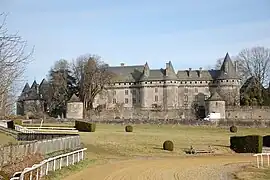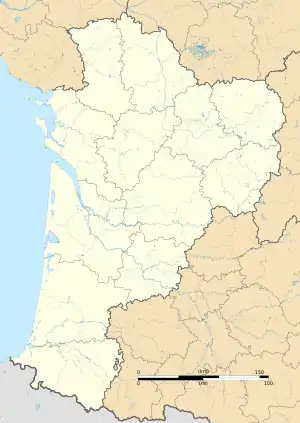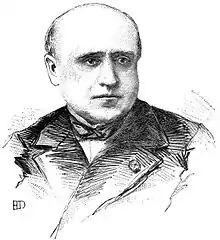Arnac-Pompadour
Arnac-Pompadour (French pronunciation: [aʁnak pɔ̃paduʁ]; Occitan: Arnac e Pompador) is a commune in the Corrèze department in the Nouvelle-Aquitaine region of central France.
Arnac-Pompadour | |
|---|---|
 Chateau of Arnac-Pompadour | |
.svg.png.webp) Coat of arms | |
Location of Arnac-Pompadour | |
 Arnac-Pompadour  Arnac-Pompadour | |
| Coordinates: 45°23′50″N 1°22′55″E | |
| Country | France |
| Region | Nouvelle-Aquitaine |
| Department | Corrèze |
| Arrondissement | Brive-la-Gaillarde |
| Canton | Uzerche |
| Intercommunality | CC Pays Lubersac-Pompadour |
| Government | |
| • Mayor (2020–2026) | Alain Tisseuil[1] |
| Area 1 | 15.09 km2 (5.83 sq mi) |
| Population | 1,145 |
| • Density | 76/km2 (200/sq mi) |
| Demonym | Pompadours |
| Time zone | UTC+01:00 (CET) |
| • Summer (DST) | UTC+02:00 (CEST) |
| INSEE/Postal code | 19011 /19230 |
| Elevation | 279–475 m (915–1,558 ft) |
| 1 French Land Register data, which excludes lakes, ponds, glaciers > 1 km2 (0.386 sq mi or 247 acres) and river estuaries. | |
The inhabitants of the commune are known as Pompadours in French.[3]
In Nouvelle-Aquitaine and on directional signs, the commune is usually simply called Pompadour, although the actual village of Pompadour is shared between Arnac-Pompadour and Saint-Sornin-Lavolps.
The name of Pompadour is well known due to the favourite of Louis XV, Madame de Pompadour (Jeanne-Antoinette Poisson), to whom the king gave the chateau of Pompadour and the associated title of Marquise.
The town is famous for its chateau and its stud farm, the Pompadour National Anglo-Arab Stud, headquarters of the French National Stud and France's principal production centre of Anglo-Arabian horses (although the racecourse is actually outside the commune).
Geography
Arnac-Pompadour is located some 25 km south-east of Saint-Yrieix-la-Perche and 35 km west by north-west of Brive-la-Gaillarde. Access to the commune is by the D901 road from Lubersac in the north-east passing through the southern part of the commune and the town and continuing south-west to Juillac. The D7 road also comes from Troche in the south-east passing through the town and continuing to Payzac in the west. The D126 goes north from the town through the length of the commune to join the D149 north of the commune. A railway passes through the commune: Pompadour station has rail connections to Brive-la-Gaillarde, Saint-Yrieix and Limoges. The commune is mixed forest and farmland. Apart from the town there are also the following hamlets in the commune:
- Le Mias
- Le Queyraud
- La Federie
- La Pourelie
- Plaisance
- Le Puy Chateau
- Arnac
- Laumonerie
- Chignac
- Bois Redon
- Les Combes
- La Foret Basse
- Puy Marmont
The Auvézère river passes through the north of the commune flowing from east to west. Several tributaries flow north to join it in the commune.[4]
Neighbouring communes and villages
History
Arnac was inhabited in Gallo-Roman times by a landowner named Artonacus or Artonos.
Pompadour belonged to one of the oldest lordships in Limousin: the Lastours, Vicomte de Pompadour. The first castle was built in 1026 by Guy de Lastours to defend his possessions, coveted by the Vicomte de Ségur. He also rebuilt Arnac church and established a monastery there, given to Saint Martial's Abbey in Limoges.
As centuries went by, the suzerainty of the Pompadours spread to all the adjoining parishes. Geoffroi Hélie de Pompadour extended the castle in the 15th century having inherited the illustrious Viscounty of Comborn in 1513. The House of Pompadour had reached its religious, military and political height. Elevated to a marquisate, it died out at the dawn of the 18th century, with several successive deaths.
After that family died out, the inheritance (including the estate, the title and coat-of-arms) was disputed in a long trial between the Prince of Conti and the Marquis de La Vallière and it was finally transferred to the Crown. In 1745, Louis XV gave it to his favourite, Mme d'Étiolles, who was given the title Marquise de Pompadour.
In 1760, a few years before her death, she left the castle and it returned to the Crown. In the following year Louis XV established a Royal Stud at the Castle and the 333 hectare estate (spread across several communes) based on the private stud that had been established by the Marquise in 1751. It was closed at the fall of the Ancien Régime then re-established by the French Directory in 1795 and became the National Stud in 1872. It is currently a famous National Stud specialising particularly in developing the Anglo-Arab breed.
During the French Revolution the commune took the name Arnac-la-Prairie.[5]
Heraldry
.svg.png.webp) Arms of Arnac-Pompadour |
The official status of the blazon remains to be determined
Blazon:
|
Administration
List of Successive Mayors[6]
| From | To | Name | Party |
|---|---|---|---|
| 2001 | 2014 | Jean Michel Reillier | PS |
| 2014 | 2026 | Alain Tisseuil |
Demography
In 2017 the commune had 1,133 inhabitants.
|
| ||||||||||||||||||||||||||||||||||||||||||||||||||||||||||||||||||||||||||||||||||||||||||||||||||||||||||||||||||
| Source: EHESS[5] and INSEE[7] | |||||||||||||||||||||||||||||||||||||||||||||||||||||||||||||||||||||||||||||||||||||||||||||||||||||||||||||||||||
Cultural heritage

Civil Heritage
- The Château de Pompadour (15th century)
 is registered as a historical monument.[8][9] Of the castrum of Guy de Lastours, built around 1000, nothing remains. The castle was completely rebuilt in the 15th century by Geoffrey Helie de Pompadour[10] who became marquis in 1614. The title of Marquis de Pompadour became famous when King Louis XV gave it to his mistress, the famous Marquise de Pompadour in 1745. The marquisate was bought in 1761 by the Duke of Choiseul before the creation in 1763 of the horse stud by the Comptroller General of Finance Bertin. The castle was no longer maintained and was not habitable in 1790 apart from the middle part. After 1793 the castle was mostly pulled down leaving no more than part of the middle and the gatehouse.
is registered as a historical monument.[8][9] Of the castrum of Guy de Lastours, built around 1000, nothing remains. The castle was completely rebuilt in the 15th century by Geoffrey Helie de Pompadour[10] who became marquis in 1614. The title of Marquis de Pompadour became famous when King Louis XV gave it to his mistress, the famous Marquise de Pompadour in 1745. The marquisate was bought in 1761 by the Duke of Choiseul before the creation in 1763 of the horse stud by the Comptroller General of Finance Bertin. The castle was no longer maintained and was not habitable in 1790 apart from the middle part. After 1793 the castle was mostly pulled down leaving no more than part of the middle and the gatehouse. - The Pompadour Racecourse is known as the city of the horse and organizes racing every Sunday during the summer in the outdoor enclosure facing the castle. It also hosts an international cross-country course.
- The 'Club Méditerranée of Pompadour village hosts many French and European holidaymakers. It has an accommodation capacity of 450 rooms and numerous sports facilities (19 tennis courts, 3 riding courses with two first-class, five riding schools, a rugby/soccer field etc.). This property has been known since the 1970s to be the spearhead of horse riding for Club Med.
- The National Stud of Pompadour houses the headquarters of the National Stud.
- The Stallion stables of Puy-Marmont houses about 65 stallions of various breeds.
Religious heritage
- The Chapel of Saint Blaise contains a framed Painting: Child Jesus Sleeping (1863)
 which is registered as an historical object.[11]
which is registered as an historical object.[11] - The Church of Saint-Pierre and Saint-Pardoux (11th century)
 is registered as a historical monument.[12] The church contains many items that are registered as historical objects:
is registered as a historical monument.[12] The church contains many items that are registered as historical objects:
- A Statue: Saint Martial (16th century)
 [13]
[13] - A framed Painting: The Virgin exiting the Tomb (1875)
 [14]
[14] - The whole western facade (15th century)
 [15]
[15] - The Shrine of Saints Pardoux and Martial (1764)
 [16]
[16] - A Statue: Saint Martial (15th century)
 [17]
[17] - A Statue: Saint Pardoux (15th century)
 [18]
[18] - A Statue: Virgin and child (15th century)
 [19]
[19]
- A Statue: Saint Martial (16th century)
Notable people linked to the commune
- Joseph Brunet, born at Arnac-Pompadour on 4 March 1829, died at La Bourgade (Haute-Vienne) on 6 January 1891, was a magistrate and politician, Minister of Public Instruction, Culture, and Fine Arts in 1877, Senator for Correze from 1876 to 1885.
- Jules Comby (1853–1947), a famous pediatrician was born in the commune
- Eugene Gayot, former director of the National Stud of Pompadour.
- Pierre Villepreux (1943-), a former rugby union player and national team coach was born in the commune
- Pierre Pechdo, former director of the National Stud of Pompadour.
Philately
A postage stamp, worth 3.00 francs (€0.46), representing Arnac-Pompadour castle was issued on 10 July 1999.[20] A postage stamp for 20g priority letters depicting Arnac-Pompadour castle was issued in 2012. It was part of the "Castles and stately homes of our regions 2012" series.[21]
See also
References
- "Répertoire national des élus: les maires". data.gouv.fr, Plateforme ouverte des données publiques françaises (in French). 2 December 2020.
- "Populations légales 2020". The National Institute of Statistics and Economic Studies. 29 December 2022.
- Inhabitants of Corrèze (in French)
- Google Maps
- Des villages de Cassini aux communes d'aujourd'hui: Commune data sheet Arnac-Pompadour, EHESS (in French).
- List of Mayors of France (in French)
- Population en historique depuis 1968, INSEE
- Ministry of Culture, Mérimée PA00099655 National Stud of Pompadour (in French)

- Christian Remy, The château de Pompadour, pp. 271-287, in Archaeological Congress of France, 163rd session, Corrèze, 2005, French Society of Archaeology, Paris, 2007 (in French)
- Ulysse magazine, September–October 2009, p.12 (in French)
- Ministry of Culture, Palissy PM19000554 Painting: Child Jesus Sleeping (in French)

- Ministry of Culture, Mérimée PA00099656 Church of Saint-Pierre and Saint-Pardoux (in French)

- Ministry of Culture, Palissy PM19000875 Statue: Saint Martial (in French)

- Ministry of Culture, Palissy PM19000721 Painting: The Virgin exiting the Tomb (in French)

- Ministry of Culture, Palissy PM19000624 Whole western facade (in French)

- Ministry of Culture, Palissy PM19000521 Shrine of Saints Pardoux and Martial (in French)

- Ministry of Culture, Palissy PM19000497 Statue: Saint Martial (in French)

- Ministry of Culture, Palissy PM19000496 Statue: Saint Pardoux (in French)

- Ministry of Culture, Palissy PM19000495 Statue: Virgin and child (in French)

- The Stamp in 1999 on the Wikitimbres.fr website (in French)
- Series "Castles and stately homes of our regions 2012" Archived 2014-04-19 at the Wayback Machine (in French)
External links
- The Pays de Pompadour website (in French)
- Arnac-Pompadour official website Archived 2013-10-29 at the Wayback Machine (in French)
- Arnac-Pompadour on the National Geographic Institute website (in French)
- Arnac-Pompadour on Géoportail, National Geographic Institute (IGN) website (in French)
- Arnac and Pompadour on the 1750 Cassini Map
